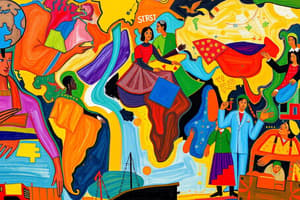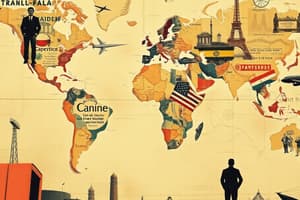Podcast
Questions and Answers
What is the primary driver of globalization mentioned?
What is the primary driver of globalization mentioned?
- Cultural exchange
- Technology (correct)
- Geographical exploration
- Political relationships
Which period of globalization is characterized by the invention of writing and the wheel?
Which period of globalization is characterized by the invention of writing and the wheel?
- The Modern Period
- The Contemporary Period
- The Prehistoric Period
- The Pre-modern Period (correct)
What aspect does globalization touch upon, beyond material levels?
What aspect does globalization touch upon, beyond material levels?
- Local economies
- Environmental concerns
- Subjective human consciousness (correct)
- Government regulations
Which of the following is NOT a characteristic of globalization?
Which of the following is NOT a characteristic of globalization?
What defines the Contemporary Period of globalization?
What defines the Contemporary Period of globalization?
Globalization is primarily seen as a process of what?
Globalization is primarily seen as a process of what?
Which dimension refers to the global development of economic relations?
Which dimension refers to the global development of economic relations?
What is a primary feature of globalization as it pertains to social relations?
What is a primary feature of globalization as it pertains to social relations?
Which countries are included in the BRICS economies?
Which countries are included in the BRICS economies?
What is the primary purpose of the General Agreement on Trade in Services (GATS)?
What is the primary purpose of the General Agreement on Trade in Services (GATS)?
Which of the following characteristics are associated with the North?
Which of the following characteristics are associated with the North?
What distinguishes First World countries from Third World countries?
What distinguishes First World countries from Third World countries?
When was South Africa added to the BRICS group?
When was South Africa added to the BRICS group?
Which of the following is a characteristic of the 'Golden Straitjacket' concept?
Which of the following is a characteristic of the 'Golden Straitjacket' concept?
Which of the following best defines regionalism?
Which of the following best defines regionalism?
Which country is noted for its successful textile and software exports?
Which country is noted for its successful textile and software exports?
Which statement accurately describes neoliberalism?
Which statement accurately describes neoliberalism?
What does the General Agreement on Tariffs and Trade (GATT) primarily address?
What does the General Agreement on Tariffs and Trade (GATT) primarily address?
Which statement accurately describes China's current economic status?
Which statement accurately describes China's current economic status?
Which of the following statements is NOT a characteristic of modern countries as described?
Which of the following statements is NOT a characteristic of modern countries as described?
Which round of negotiations led to the establishment of the GATS?
Which round of negotiations led to the establishment of the GATS?
What is primarily criticized by the Global Justice Movement?
What is primarily criticized by the Global Justice Movement?
Which power is NOT attributed to International Organizations (IOs)?
Which power is NOT attributed to International Organizations (IOs)?
Which of the following is NOT one of the four main purposes of the UN Charter?
Which of the following is NOT one of the four main purposes of the UN Charter?
Which of the following describes a basic element of a state?
Which of the following describes a basic element of a state?
What is one impact of globalization on the state?
What is one impact of globalization on the state?
Which aspect is associated with the Global South?
Which aspect is associated with the Global South?
What role does social media play in new transnational activism?
What role does social media play in new transnational activism?
What is a significant consequence of globalization as discussed in the content?
What is a significant consequence of globalization as discussed in the content?
What is the primary aim of economic integration?
What is the primary aim of economic integration?
Which institution provides loans to countries specifically for capital projects?
Which institution provides loans to countries specifically for capital projects?
Which form of sovereignty emphasizes a nation's power to govern itself without outside interference?
Which form of sovereignty emphasizes a nation's power to govern itself without outside interference?
What type of agreement is characterized by the elimination of tariffs and quotas between member states?
What type of agreement is characterized by the elimination of tariffs and quotas between member states?
Which organization ensures that international trade flows smoothly and provides a platform for negotiating trade agreements?
Which organization ensures that international trade flows smoothly and provides a platform for negotiating trade agreements?
How many European countries are members of the European Union?
How many European countries are members of the European Union?
What characterizes Preferential Trade Areas (PTAs)?
What characterizes Preferential Trade Areas (PTAs)?
Which of the following best describes Interdependence Sovereignty?
Which of the following best describes Interdependence Sovereignty?
Flashcards are hidden until you start studying
Study Notes
Globalization Overview
- Globalization refers to the worldwide interaction and integration of cultures, economies, and governance.
- It involves the flow of goods, ideas, and people, driven by international trade, investment, and technology.
- Marks a significant increase in global connectivity and economic integration.
Characteristics of Globalization
- Creation of new social networks and expansion of existing ones across political, economic, and cultural boundaries.
- Characterized by the stretching of social relations and intensification of exchanges.
- Influences both objective economic levels and subjective human consciousness.
Historical Periods of Globalization
- Prehistoric Period (10,000 BCE - 3,500 BCE): Early human interactions among hunter-gatherers.
- Pre-modern Period (3,500 BCE - 1,500 CE): Technological advancements like writing and the wheel fostered globalization.
- Early Modern Period (1,500 - 1,750): Establishment of universal moral and legal concepts.
- Modern Period (1,750 - 1,970): Innovations in transportation and communication transformed global interactions.
- Contemporary Period (1970 - present): Significant worldwide interdependencies and acceleration in globalization processes.
Economic Dimensions of Globalization
- Extensive growth in global economic relationships due to technological advancements.
- Fostered by foreign investment by businesses and individuals across borders.
BRICS Economies
- BRICS refers to Brazil, Russia, India, China, and South Africa.
- Initially coined as BRIC in 2003 by Goldman Sachs, projecting dominance by 2050.
- South Africa was added in April 2011, completing the BRICS group.
International Trade Agreements
- General Agreement on Trade in Services (GATS): First multilateral service trade agreement effective from 1995.
- General Agreement on Tariffs and Trade (GATT): Focuses on equitable access to foreign markets and promotes trade liberalization.
Concepts of Sovereignty
- Economic sovereignty: The capacity of governments to make independent decisions without external influence.
- Distinctions between international legal sovereignty, Westphalian sovereignty, interdependence sovereignty, and domestic sovereignty.
Key Financial Institutions
- World Bank (WB): Provides loans for capital projects to countries globally.
- International Monetary Fund (IMF): Monitors global economies, lends to countries, and aids economic stability.
- World Trade Organization (WTO): Regulates international trade and facilitates negotiations.
European Integration and the EU
- European integration promotes political, legal, and economic unity among European states.
- The European Union (EU) consists of 28 member countries implementing shared policies.
Economic Integration Stages
- Preferential Trade Areas (PTAs): Agreements to reduce/eliminate tariffs.
- Free Trade Agreements (FTAs): Eliminate tariffs and quotas among member countries.
Global Justice Movement and Activism
- A coalition advocating for fair trade and critiquing global economic institutions like the WTO.
- New transnational activism leverages globalization sentiments for social change.
Contemporary Global Governance
- Evolved from neoliberal impacts on international relations, dominated by intergovernmental organizations (IOs).
- United Nations (UN) aims to promote cooperation and maintain international order.
Role and Impact of the Nation-State
- States define basic elements: territory, population, and sovereign power.
- Globalization's repercussions on states include increased poverty, environmental issues, economic crises, and rising organized crime.
Global South vs. Global North
- Global South represents countries with historical ties to colonialism and ongoing economic disparities.
- Global North refers to wealthier, developed nations with higher living standards and industrialization.
World Divisions
- First World: Developed capitalist countries (North America, Western Europe, Japan, Australia).
- Second World: Former communist states (Eastern Europe, Russia, China).
- Third World: Developing nations in Africa, Asia, and Latin America.
Regionalism
- Involves decentralizing political power from higher to lower levels of governance.
National Economic Strategies
- Japan: Focused on securing raw materials to enhance global market competitiveness.
- India: Shifted to an export-oriented strategy, excelling in textiles and software development.
- China: Currently the largest importer of raw materials, leading in global steel production.
Studying That Suits You
Use AI to generate personalized quizzes and flashcards to suit your learning preferences.




